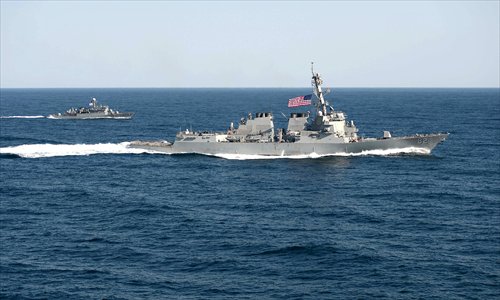China warns US over incursion
Beijing will ‘do whatever is necessary’

A photo handed out by the US Navy on March 12 shows the destroyer USS Lassen cruising with a South Korea warship during exercise Foal Eagle 2015. The US defied China Tuesday by sending the destroyer close to China's Nansha Islands. Photo: AFP
China's foreign ministry on Tuesday expressed "strong discontent" over a US warship's "illegal entry" into waters near a reef in the South China Sea, threatening to take whatever measures are necessary against any deliberate provocations.
Experts said the announcement represented a warning from China, but that the nation is not willing to see an escalation into military conflict. Experts called for both parties to resort to legal and diplomatic approaches.
According to a Reuters report on Tuesday, one US defense official said the destroyer USS Lassen sailed within 12 nautical miles of Zhubi Reef.
A second defense official said the mission, which lasted a few hours, included Meiji Reef.
Earlier this year, China revealed that it was building civil and military facilities over both reefs, which are part of its Nansha Islands.
The operation was approved by US President Barack Obama, CNN reported on Tuesday, citing an anonymous official as saying that the mission was "routine."
The US warship was monitored, tracked and issued a warning, said Lu Kang, a spokesperson for the Ministry of Foreign Affairs, on Tuesday.
A guided-missile destroyer and a patrol boat gave warnings to the US warship, Yang Yujun, a spokesman for the Ministry of National Defense, said on Tuesday.
He said the reoccurrence of similar incidents should be prevented in the future.
China will continue to watch the situation and "do whatever is necessary," Lu said during a regular press briefing in Beijing.
Stressing that China's sovereignty over the Nansha Islands and its adjacent waters is "irrefutable," Lu said China is prepared to respond to any deliberate provocation by any country and urged the US to "immediately correct its wrongdoing."
Lu said that China is firmly opposed to any action that harms China's sovereignty and security in the name of freedom of navigation.
China's Vice Foreign Minister Zhang Yesui also summoned US Ambassador Max Baucus on Tuesday to protest against the US naval patrol, calling it "extremely irresponsible."
'Predictable' act
The dispatch of the US warship was predictable since the US had reiterated the plan several times, Zhu Feng, a professor of international security at Nanjing University, told the Global Times on Tuesday. He said the US had to follow through with its action to maintain credibility with its allies.
The US will take such measures against any country that is considered by the US as curtailing its freedom of navigation, in a bid to show that it aims at defending the right, an expert at the Academy of Military Science, who asked for anonymity, told the Global Times.
A US defense official told Reuters that "It's not something that's unique to China."
US warships have defended this right against almost all coastal countries, a research fellow at the Chinese Naval Research Institute, who asked not to be named, told the Global Times on Tuesday, citing the passage of US warships from the Mediterranean into the Black Sea during the Cold War as an example.
Given the current situation, the US is unlikely to let go if its demands are not met, said the research fellow at the Chinese Naval Research Institute.
The second US defense official said additional patrols would follow in coming weeks and could be conducted around features that Vietnam and the Philippines have built up in the Nansha Islands, according to Reuters.
Probe reaction
"The US move is more of a probe of China's reaction rather than a showdown," Zhu said, adding that China needs to have a well-considered plan in response, such as getting ready to monitor US warships or planes, or driving them off when necessary.
But China should move carefully to avoid military conflict, he said.
The expert at the Academy of Military Science said the passage of the USS Lassen is the least serious move available to the US, compared with other options like conducting military drills and joint passage of Japanese and Philippine warships.
China also made a minimal response, he said.
Unlike the intense relationship between the US and former Soviet Union, the US is also worried that radical military actions would harm Sino-US cooperation, the research fellow at the Chinese Naval Research Institute added.
The research fellow suggested setting up a "security alert zone" by China in the controversial waters in order to prevent further conflicts.
China and the US in September signed two documents on "notification of military crisis" and "encounters in the air" in a bid to avoid military conflicts caused by miscalculation over the seas, according to the Xinhua News Agency.
Agencies contributed to this story